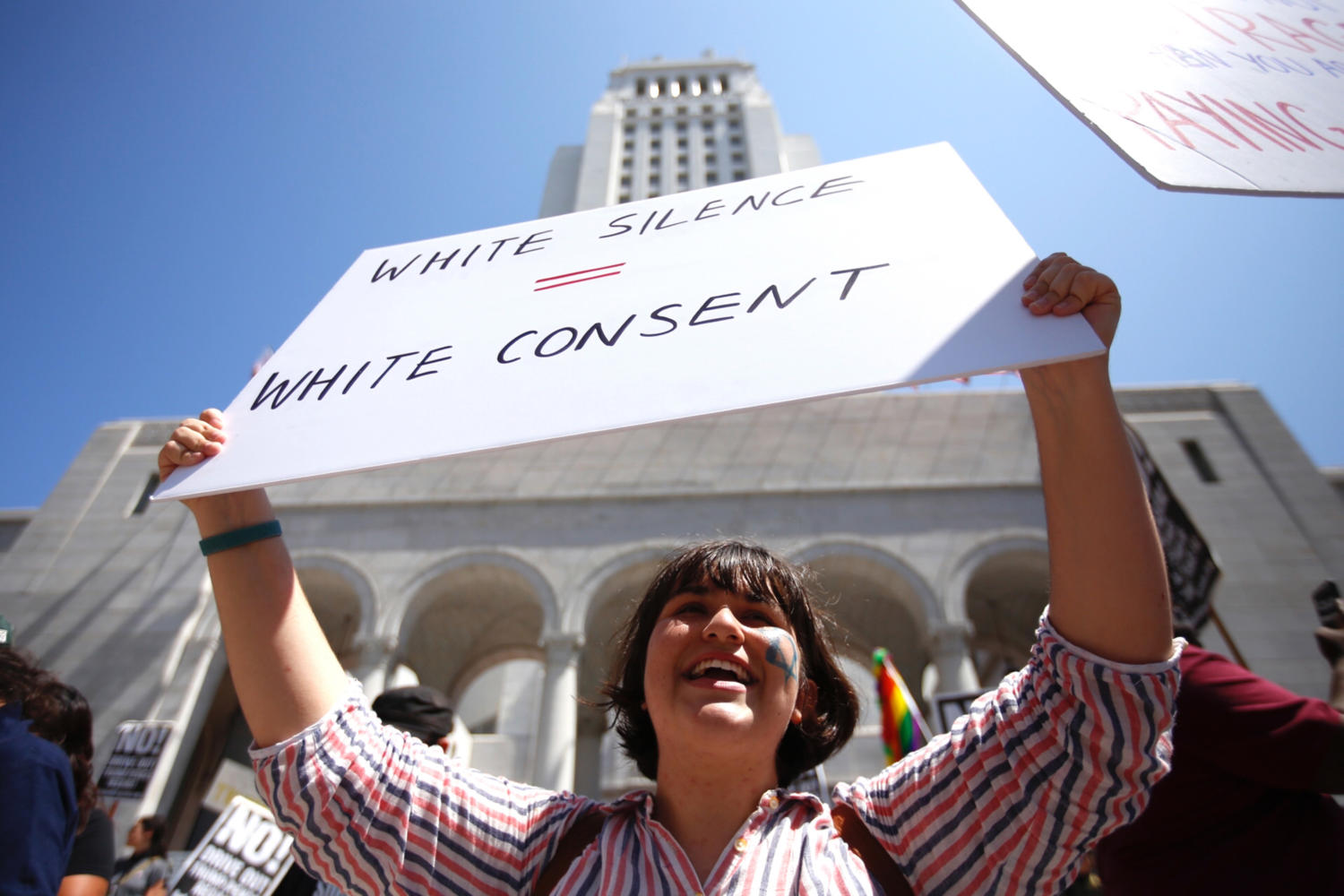Alan Garfield: Why do we allow hate speech?
Juliette Polonsky, Pasadena in a during rally a local group calling itself Refuse Fascism rallies at City Hall in Los Angeles to denounce the violence and honor the victims in Charlottesville, Virginia August 13, 2017. (Francine Orr/ Los Angeles Times/TNS)
August 26, 2017
Why do we allow white supremacists to spew their bile? Why not arrest them for their hate speech? Why not lock them up before another person is poisoned by their ideas?
Those are fair questions. Indeed, similar reasoning has prompted many liberal democracies to outlaw hate speech.
So why, then, do we permit hate speech?
Advertisement
It’s too simplistic to say that the First Amendment forbids us to punish hate speech. Yes, it’s true that the amendment says that “no law” shall abridge the freedom of speech. But no court has ever interpreted the amendment so literally. Justice Oliver Wendell Holmes disposed of that notion long ago with a single sentence: “The most stringent protection of free speech would not protect a man in falsely shouting ‘fire’ in a theatre and causing a panic.”
If we protect hate speech, it is because we choose to do so. But why would we do that?
The reason is that Americans believe it is safer to entrust people with access to ideas than to entrust the government with the power to decide which ideas we may express or hear. In other words, the cure for bad ideas — government censorship — is worse than the disease itself.
Certainly, this principle makes sense when people reasonably disagree about which ideas are meritorious. We don’t want the government deciding whether we can talk about evolution or socialized medicine or the value of fighting a foreign war. But hopefully the vast bulk of Americans would agree that hate speech is unequivocally bad. So why not banish this one indisputably pernicious idea from the marketplace of ideas?
Maybe we should. But try creating an exception to the First Amendment you could live with.
At first glance, that doesn’t seem hard to do. For example, why not this rule: “Speech that disparages a group of people based on their race, national origin, religion, gender, or sexual orientation is not protected”?
This sounds good in theory, and few of us would shed a tear if the government used this exception to prosecute Ku Klux Klan members or neo-Nazis.
Advertisement*
But whenever you carve out an exception to the First Amendment, it can come back to haunt you. What if the government declared that “Black Lives Matter” is hate speech toward whites? What if the government declared that a public celebration of Israel’s Independence Day is hate speech toward Palestinians? What if the government declared opposition to same-sex marriage to be hate speech toward gays and lesbians or opposition to religious accommodations to be hate speech toward religious believers?
Do we really want the government deciding which ideas are worthy of First Amendment protection? Or are we better off barring the government from making these decisions?
Our nation has chosen the latter approach. That’s why the Supreme Court has repeatedly stated that “there is no such thing as a false idea” under the First Amendment. Federal Judge Frank Easterbrook captured the reasoning behind this approach. “Any other answer,” he observed, “leaves the government in control of all of the institutions of culture, the great censor and director of which thoughts are good for us.”
So that’s why we protect hate speech.
This doesn’t mean white supremacists have a right to threaten individuals, engage in violence, or incite imminent law-breaking. These actions are not protected by the First Amendment — they are the equivalent of falsely yelling fire in a crowded theater.
Nor has the Supreme Court held that the Second Amendment gives white supremacists (or anyone) a right to bring guns to their rallies. The court has said only that the right to bear arms protects the right to possess a handgun at home. (In Charlottesville, the problem was a Virginia law that permits the open carrying of weapons.) All white supremacists have is a right to assemble peacefully to espouse their ideas.
While white supremacists may express their beliefs, however vile, that doesn’t mean that the rest of us must remain silent. Indeed, the opposite is true.
Implicit in the decision to entrust people with access to ideas is the responsibility of people of goodwill to expose the fallacy of pernicious ideas. Because we can’t rely on government censorship to stem the spread of racist ideas, it is up to us — “We the People” — to do so.
The proper response to a march by 100 neo-Nazis is not censorship. It is a counter-demonstration of thousands of people committed to tolerance — as recently happened in Boston
Now, more than ever, Americans opposed to hatred and white supremacy need to raise their voices in unison and denounce racism and xenophobia. Now, more than ever, Americans who believe in tolerance and inclusivity need to use their sacred right to vote to remove public officials who pit one American against another instead of fostering unity.
The Rev. Dr. Martin Luther King Jr. said of an earlier era: “History will have to record that the greatest tragedy of this period of social transition was not the strident clamor of the bad people, but the appalling silence of the good people.”
Let us ensure that no one could ever say the same about our own era.
___
(c)2017 The Philadelphia Inquirer
Visit The Philadelphia Inquirer at www.philly.com
Distributed by Tribune Content Agency, LLC.
Advertisement








